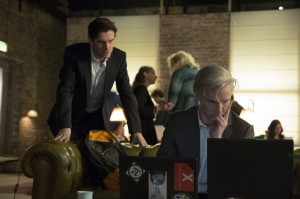
By: Joel Frehn | The Duquesne Duke
When a film, such as The Fifth Estate, chronicles something as polarizing as Wikileaks – the unauthorized release of classified U.S. military documents-the last angle that I would have expected Hollywood to pursue was the bromance in Fifth Estate.
The film, released Oct. 18, details the events of Julian Assange and WikiLeaks, an organization that seeks to release government information and documents.
Traditionally, the focus of the adventures of two men with a deep friendship that undercuts romantic intrusion in their lives has been used in comedic form: take the action-comedy Sherlock Holmes: A Game of Shadows or any of Paul Rudd’s films of late. Yet, the first blockbuster tackling WikiLeaks focused on a bromance gone wrong: the destruction of an exceptionally intense friendship. In this case, the camera focuses on the relationship between Julian Assange (Benedict Cumberbatch) and Daniel Berg (Daniel Bruhl).
The film paints Assange as an overbearing but splintered figure, both of which contribute to the loss of his friendship with Berg. Similar to the film I’m Not There, which focuses on some of the reinventions of Bob Dylan‘s public persona, The Fifth Estate focuses on the multiple sides of Julian Assange. Instead of using different actors and costumes, the myriad of Assanges are represented through skilled craftsmanship by Cumberbatch.
One side of the character is frustrated with the hacking community’s embrace of nerd culture, instead of digital activism. Another version becomes intoxicated with celebrity culture and turns what was envisioned as a conduit to utopia into a vanity project. More chilling is the one who takes over the final reel of the film: a man in who is hostage to his fury and desire to punish the government, regardless of the cost.
The film also presents an interesting visual metaphor which chronicles his relationship with Berg. The friendship between the two men is represented as an open aired office building. As their power and resources grow, so does the office, starting from a two desk setup, to an entire floor of operations. The dissolution of their friendship is marked with the physical destruction of the office, at the end of the film.
Along with this clever visual metaphor, the film also chronicles the destruction of the friendship between the two men by regrettably retreading artistic ground: in this case, the BBC series Sherlock. Cumberbatch stars as the title character in the program, in which his relationship with John Watson (Martin Freeman) mirrors the relationship between Julian Assange and Daniel Berg. The viewer is presented with images of the men spending a lot of time together on their digital crusade, the same way Holmes and Watson ignore other social opportunities.
While the film focuses on the destruction of the friendship between the two men, it tries to paint a portrait of the effects of Assange’s Ahab-like crusade. Peter Capaldi and David Thewlis star as two of the newspaper connections that Assange coordinated with in the dispersion of his information. Considering the limited screen time they have, they excel in not being reduced to background presences. However, the coverage of the film excludes Chelsea Manning, who is name dropped, but does not have a screen presence. We see characters talking about her, but never see her physically, on screen; this is a result of the decision to focus on the Berg -Assange tension, which limited the creative team in terms of the story’s scope.
The Fifth Estate is a good film in terms of the craftsmanship. Because WikiLeaks is a polarizing topic, I cannot recommend it due to the inevitable politics and questions of historical accuracy. I saw it because of Cumberbatch’s presence and was rewarded with a well-acted and visually slick tech-thriller.

